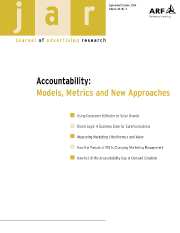Crossref Citations
This article has been cited by the following publications. This list is generated based on data provided by
Crossref.
Berkes, Péter
Nyerges, Mihály
and
Váczi, János
2007.
Macro-aspects affecting sport sponsorship: The case of Hungarian professional soccer clubs’ sponsors.
Society and Economy,
Vol. 29,
Issue. 3,
p.
383.
Bonaglia, Federico
Goldstein, Andrea
and
Mathews, John A.
2007.
Accelerated internationalization by emerging markets’ multinationals: The case of the white goods sector.
Journal of World Business,
Vol. 42,
Issue. 4,
p.
369.
Bonaglia, Federico
Goldstein, Andrea
and
Mathews, John A.
2007.
Accelerated Internationalisation by Emerging Multinationals: The Case of the White Goods Sector.
SSRN Electronic Journal,
Chadwick, Simon
and
Thwaites, Des
2008.
Commitment in Sponsorship Relationships.
Journal of General Management,
Vol. 34,
Issue. 1,
p.
71.
Omar, Maktoba
Williams, Robert L.
and
Lingelbach, David
2009.
Global brand market‐entry strategy to manage corporate reputation.
Journal of Product & Brand Management,
Vol. 18,
Issue. 3,
p.
177.
Johnston, Margaret A.
2010.
The impact of sponsorship announcements on shareholder wealth in Australia.
Asia Pacific Journal of Marketing and Logistics,
Vol. 22,
Issue. 2,
p.
156.
2010.
Relationship Marketing in Sports.
p.
185.
Woodside, Frances
and
Summers, Jane
2011.
Sponsorship leveraged packaging: An exploratory study in FMCG.
Journal of Marketing Communications,
Vol. 17,
Issue. 2,
p.
87.
Benkraiem, Ramzi
Le Roy, Frédéric
and
Louhichi, Waël
2012.
Football et Bourse : Analyse de la volatilité autour des annonces de résultats.
Recherches en Sciences de Gestion,
Vol. N° 91,
Issue. 4,
p.
83.
O. Madichie, Nnamdi
2013.
Ode to a “million dollar” question: does the future of football lie in the Middle East?.
Management Decision,
Vol. 51,
Issue. 9,
p.
1839.
Tyrie, Anna
and
Ferguson, Shelagh
2013.
Understanding value from arts sponsorship: a social exchange theory perspective.
Arts Marketing: An International Journal,
Vol. 3,
Issue. 2,
p.
131.
Harald Dolles and Professor Sten Söderman, Professor
Morgan, Ashlee
Adair, Daryl
Taylor, Tracy
and
Hermens, Antoine
2014.
Sport sponsorship alliances: relationship management for shared value.
Sport, Business and Management: An International Journal,
Vol. 4,
Issue. 4,
p.
270.
Johnston, Margaret A.
and
Paulsen, Neil
2014.
Rules of engagement: A discrete choice analysis of sponsorship decision making.
Journal of Marketing Management,
Vol. 30,
Issue. 7-8,
p.
634.
Nunes, Joana Sofia dos Santos
and
Machado, Ana Teresa
2014.
Patrocínio e influência na atitude relativamente à marca e intenção de compra: caso Nike e Selecção Portuguesa de Futebol.
Comunicação pública,
de Haan, Donna
Osborne, Angela
and
Sherry, Emma
2015.
Satire or Send-Up? Paddy Power and Blind Football.
Communication & Sport,
Vol. 3,
Issue. 4,
p.
411.
Martinez, Richard J.
and
Janney, Jay J.
2015.
Market Reactions to Corporate Sponsorships of European Football Kits: The Moderating Effects of Firm Congruence.
Journal of Sport Management,
Vol. 29,
Issue. 2,
p.
211.
Athanasopoulou, Pinelopi
and
Sarli, Elena
2015.
The development of new sponsorship deals as new business-to-business services.
Journal of Business & Industrial Marketing,
Vol. 30,
Issue. 5,
p.
552.
Mazodier, Marc
2016.
Making a Difference Through Marketing.
p.
3.
Lagae, Wim
2016.
The Economics of Professional Road Cycling.
Vol. 11,
Issue. ,
p.
83.
Angell, Robert J.
Gorton, Matthew
Bottomley, Paul
and
White, John
2016.
Understanding fans’ responses to the sponsor of a rival team.
European Sport Management Quarterly,
Vol. 16,
Issue. 2,
p.
190.




